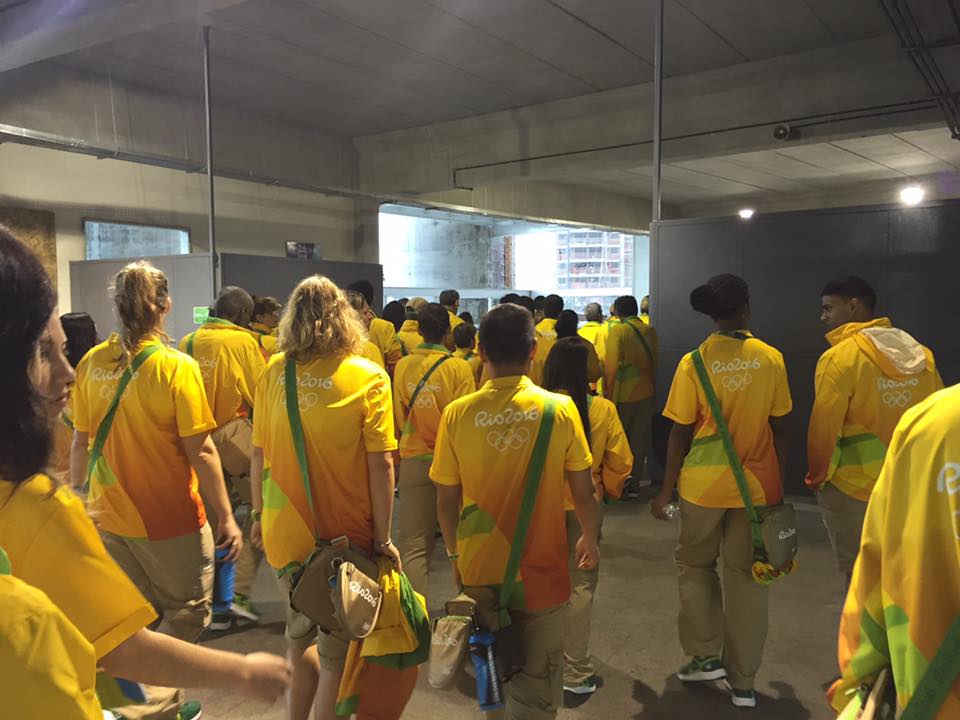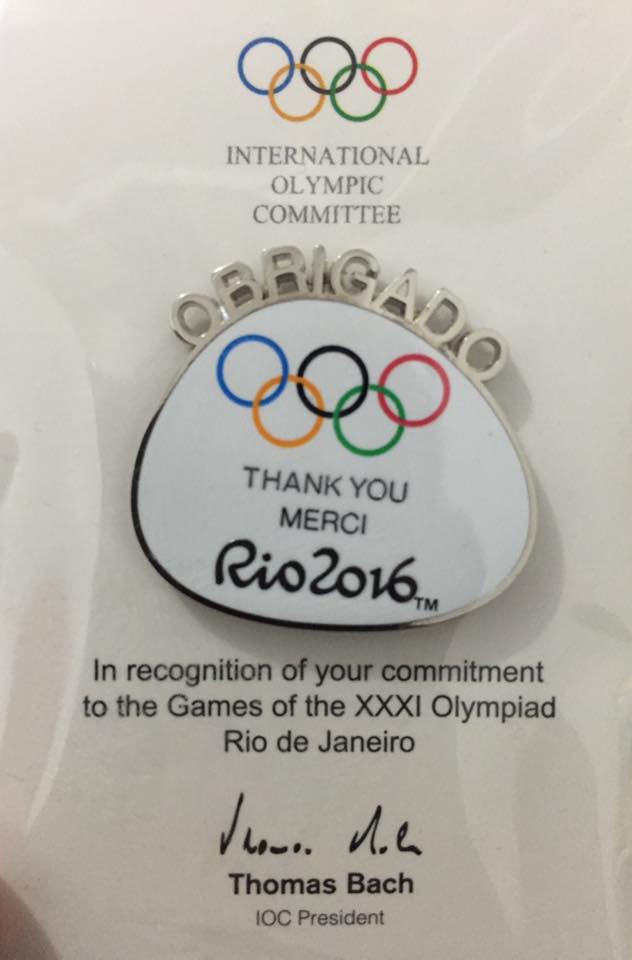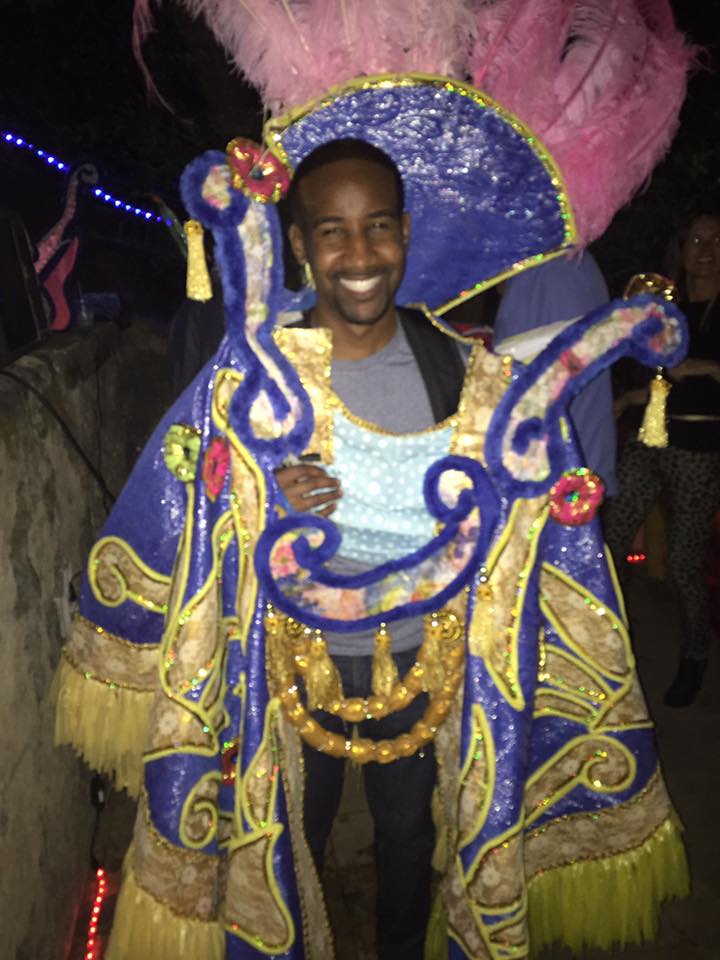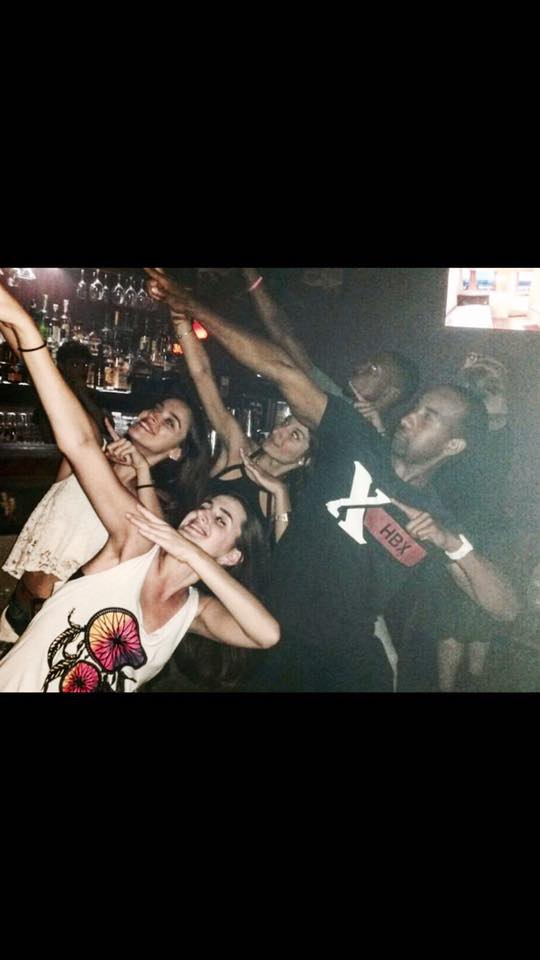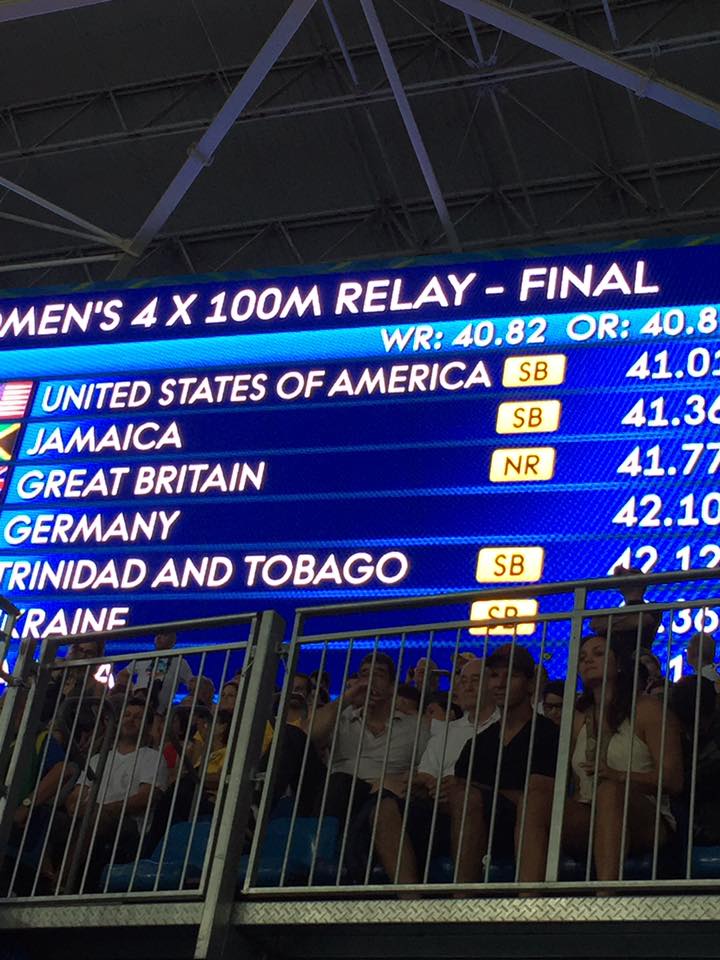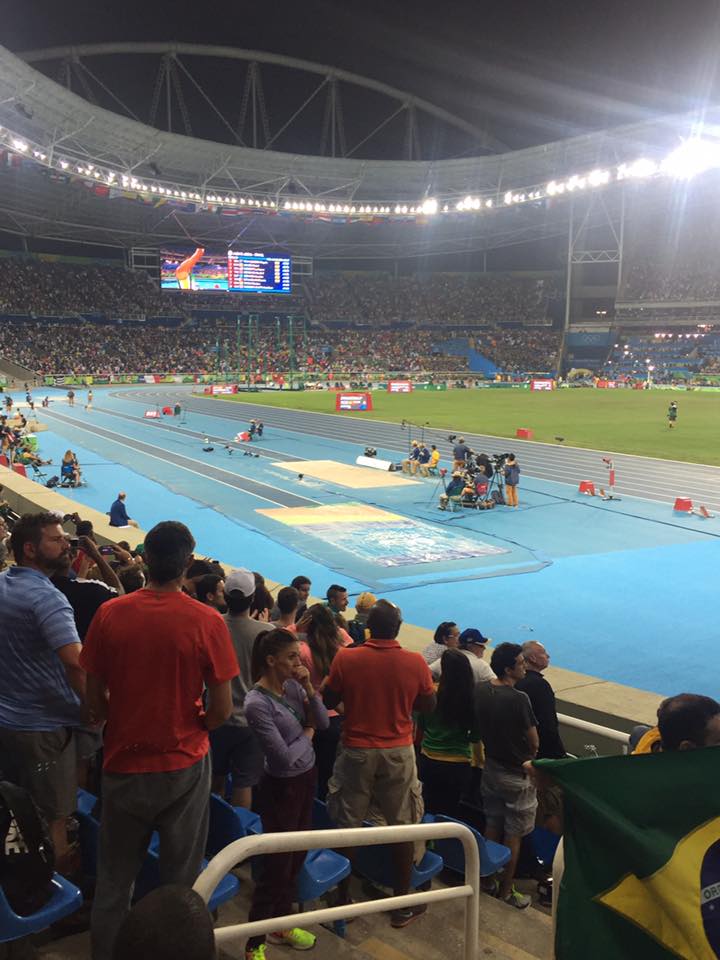Rio de Janeiro, Brazil
I always imagine myself running for Team USA at the Olympics ever since I saw Nick Symmonds dominate the 800-Meter USA Olympic Trials back in 2008. But due to physical limitations, I never came close competing at that level. However, I refused to allow my shortcomings to deter me from what I had set my eyes on. Early fall in 2014, I signed up to be a volunteer for the 2016 Rio Olympic Games.
The process for applying to be a volunteer was quite lengthy. The Olympic volunteer portal opens up two years prior to the start of the games. The entire application itself took 15-20 minutes to complete. They ask for a complete history of your sports background, accomplishments, education history, leadership skills, work history, and the list go on! Additionally, they ask for three areas of interest, in order of interest, of what you'd like to volunteer for. The area included:
1) Serving the Public: Which could include positions anywhere from language translations to navigating the line entering the stadium
2) Sports: Working with athletes as a coach for example
3) Operational Support: Making sure the event runs as smoothly and on schedule as possible
4) Press and Communications: Assisting with media support
5) Ceremonies Production: Assisting with everything and anything that is needed for the opening/closing ceremony
6) Protocol and Language: Help with language translation
7) Health Services: designated for people with a medical background
8) Technology: IT professionals
9) Transportation: Transporting the athletes from the stadium
When I submitted my application, I selected Ceremonies Productions first, because I wanted to be on stage presenting the awards and celebrating with the athletes. How awesome that would be?! My second selection was sports. I never considered myself the "Sports" type of guy though. I don't watch sports on TV unless it's in a social situation, like a work event and I don't want to be left out. Instead of watching, I would rather play it. Kill two birds with one stone this way: I get my workout for the day, and the
After a year, I received my first email for a group video interview. I was interviewing with five other volunteer candidates all living in a different country, each applying for a different function area. For thirty minutes we were tasked with answering questions that related to our passion for the Olympic Games, and situational basis questions to attest our thought process. It was kind of nerve wracking speaking in a group setting like that because you’re always comparing your response to the others. Either way I had one thing on my mind: not to have the BEST answer, but to have the most MEMORABLE response to the questions.
The last ten minutes of the interview we were assigned group projects. Each group had to identify three things we could do to make sure everyone attending the Olympic Games had an amazing experience. At the
This one was a phone interview where I was to speak
"Hi Carlvin,
Congratulations! You’re on the team! You are now a volunteer for South America’s first ever Olympic Games. You can celebrate, post on social networks, and tell the world.
Here’s the information about your assignment:
Venue: Olympic Stadium
Functional Area: Athletics (Track and Field)
Job: Field of
Play Team Member"
Description: Receive athletes in the designated arrival area; remain visible to deal with any problems and answer questions; guarantee that the athletes' areas are clean, tidy and prepared for the start of sessions. Watch over athletes' belongings to keep them safe, deal with lost belongings, manage keys, and lockers; provide clean towels and collect used ones. Guarantee that the athletes' lounge and other areas are supplied with food and drink; report any breakages or technical problems.
Since I have a strong background as an athlete and a professional with track and field/running experience, they found my strengths well suited to be with the athletes, as I understand the preparation involved.
I was so excited I felt like I might pop. I was going to be
With only three months away I started sharing my excitement and joy on social media. I was able to find an affordable housing situation online, shared with another volunteer whom I met on Facebook, which was located directly in front of the Olympic Stadium. The total apartment cost was $300 for two weeks, so $150USD per person - STEAL!!. The ad showed an apartment that was going through construction, and the description was extremely vague. Other places were being advertised for at least $600 per person and were further away, so this was one deal worth investigating.
I emailed the ad and the guy replied back almost instantly in broken English. I recommend we exchange Skype information. That way I would at least be able to read his body language, and connect his words to his actions. The guy kind of resembled a much larger, older version of Robert De Niro. We chatted for almost thirty minutes, primarily because of the language barrier, but he pretty much told me his life story from when he was in the Navy to when he moved to Brazil. He gave me a short tour of the room. It was about the size of a typical college dorm room. He was very accommodating with the furnishings in saying he’d make a list of all the items we would need, and would provide them for us upon arrival. I was still on the fence so I drafted a contract requesting his name and a photocopy of his ID to be sent to me, just in case anything happened or he tried to kidnap me (like the movie Taken or something.) After he sent me all the information, I saved everything, and sent it to my uncle and my future roommate for references. We agreed to pay for the room upon arrival. I had enough money saved up for the trip just in case anything fell through last minute, or if the renter turned out to be a creeper.
Housing - check! Next I purchased my flight, which didn't cost as much as I was expecting. I was scheduled to arrive two days prior to my sport, track and field, on August 10th, but I opted to arrive on August 7th because the flight was cheaper and wanted time to explore the area before my schedule got crazy.
Days leading up to the my departure I began reaching out to Brazilians on the site interpals.net, to learn more about the culture and to make native friends. Sharing all of this excitement with the masses, BBC Radio reached out to me via Twitter. They said they would love to have an exclusive live interview with me, along with a few Olympic athletes once I arrived in Rio. This was
The time finally arrived and I was officially at JFK airport getting ready for an opportunity of a lifetime. I’d been waiting over a year for this moment. My blood was boiling and my hands were shaking as I waited for my plane to take off. As a field of play volunteer, my main focus was to help athletes prepare for their event. So I told my friends and family don’t be surprised if they saw me on TV (with a big smile on my face). I adjusted myself on the plane and got cozy while making small talk with the person next to me. The moment I heard the engines starting, I popped two large Nyquil pills to sleep the majority of the ride. I closed my eyes and imagined myself besides Usain Bolt, grinning and talking about life.
I got to the Rio airport around 8 PM at night, and my roommate arrived shortly after. We were both meeting the older Robert De Niro in person. He was gracious enough to pick us up from the airport, and took us to our new home for the next two weeks. My inner-hood instincts were on overdrive because I didn’t understand why a stranger would be so nice. I made sure I had on my running shoes and a
I woke up the following morning around 7 AM ready to tackle the beautiful city of Rio. I tried to remain silent because my roommate was still sleeping so I slipped on my flip-flops, black shorts, and a white tank top ready to hit the beautiful beaches and natural beauty all around me. I traveled from Engenho de Dentro to Copacabana to explore the beach and to pick up my Olympic uniform. Staring at all the nearly naked, beautiful people, the golden soft sand, and the vibrant vibe of panoramic music—I felt like the culture had been waiting for my arrival all along. Everyone was extremely carefree and jovial. It also helped that I had a friend, Gabriella, who lived in Rio. She was more than happy to act as my tour guide for the duration of my stay.
Grabriella
After I collected all of my belongings and met the other volunteers over the next couple of days, I prepared to start the following morning. As a volunteer they don’t supply you with much support. We’re responsible for living arrangements and airfare. The only thing that was provided was a metro travel card, a lunch meal ticket, and our Olympic volunteer uniform which consisted of two tops, two bottoms, two pair of socks, a jacket, a pair of shoes, and a messenger bag. I was scheduled to work mornings from 6 AM to 2:30 PM. I had to arrive at the Olympic stadium fully uniformed. The check-in process was fairly simple: I would go through security, which would take about a minute or two. After that all volunteers had to enter the office to scan badges, receive our meal for the day, and wait in a designated area for our team lead to pick us up for our assignment.
My first day they assigned me to work under the stadium in the: “final call” area. This was the location where the athletes could do last minute warm-ups, shed all of their gear, and head onto the track. Because this location was where the athletes needed to be most focused, we were asked not to speak to them and if necessary, to use gentle, quiet voices. It was quite boring and such a tease to be able to hear the crowd cheer and not be able to see anything. I was grateful to even be there, but I also wanted to be in the action. I wanted to assist the athletes in a way that was familiar to me, which entailed helping them warm up or give encouragement.
After working this area all day the group and I had a quick meeting to discuss what went well and what didn’t work. The language barrier was an obvious issue because most of the volunteers spoke Portuguese. However, our team lead mentioned she needed four people who were willing to be outside, extremely active, and were not shy to interact with athletes. She added that she needed someone who wouldn’t get starstruck, and who would remain professional at all times.
This was my window of opportunity to show what I had, so my hand shot up like lightning and I screamed, “Right here!” I startled everyone and then all eyes were on me. I wasn’t afraid to speak up and said, “Hi, if you’ve forgotten, my name is Carlvin Sylvain Dorvilier from New York City, and I’m more than happy to volunteer for the reassignment.”
Everyone was still in shock from the loud outburst and my leader found it more than amusing. She said, “Well, well, well, it’s definitely yours. I don’t think I’ll need four anymore because your energy definitely equals about four people.”
Everyone laughed, but she ended up selecting two other volunteers just in case. I clocked out of my first day feeling accomplished. As I walked back to my apartment I still can’t believe I was in Rio at the freaking Olympics! I would have loved to have joined the other volunteers with their planned hiking trip, but I decided to prepare for my live BBC interview instead. The commute itself was an hour and I wanted to leave two hours ahead of time, because I did not want to get lost.
It was interesting because the interview was held at a restaurant. The whole BBC crew was there setting up with their fancy equipment. I introduced myself to the whole team, and to the three Olympians from different countries that were also going to be interviewed. For a moment I thought to myself, Why me? They could have had any well-known personality, but they chose me.
I felt like a celebrity sitting alongside Olympians. I told myself to dive in and act like I belonged there. Then the interview began. The BBC host, Ben, introduced all parties, and got into it. We all went around introducing ourselves, where we’re from, and shared our involvement with the Olympic Games. The first Olympian was a table tennis athlete, so she spoke about her experience growing up in an impoverished environment and training day in and day out to master her craft. The second athlete was a swimmer from Germany, and he spoke about his very impressive training regime. He would workout twice a day four days out of the week, covering well over twenty miles. I was focused on thinking about what I was going to share with the world. All those accomplished athletes, and then there was little ‘ole me.
Instead of speaking about my personal athletic achievements, I went ahead and thanked them for showing true grit and passion for competing at such levels. I said, “Without these athlete’s dedication, I wouldn’t be here today as a volunteer, so thank you.” Next I talked about my prediction for the 100-meter dash, saying I think Justin Gatlin would be among the top finishers, which was a great segway into discussing the recent allegations of athletes taking banned performance substances. After speaking for nearly ten minutes, I completely forgot I was on air, and it turned into more of family dinner conversation where we were all equal. The interview ended on high note, and we all exchanged Instagram handles. BBC was gracious enough to pay for my Uber ride back home, as it was nearly 11 PM after we all had a few drinks (the athletes drunk water). By the time I arrived home, my roommate was already asleep, and I had to be up within six hours for day 2!
Day 2 I was assigned to the warm-up area where I remained for the reminder of my Olympic experience. The warm-up area was the place where the athletes spent most of their time. There were tents for every competing country and inside, the athletes could relax, ice, stretch, and get post-competition massages. The countries provided their own masseuses, trainers, coaches, and anyone else they might need. These were the greatest athletes in the world; they had their warm-up routines down to a science. I was literally floating around all the tents making sure every country was well taken cared of. I was giving 100% to make sure each and every athlete performed their best. Many athletes were English speakers, but we were limited in the number of workers who were able to speak Portuguese and English. The Portuguese speaking-official had a very soft voice, so he who would speak to me and I would project the message to the athletes if their event was approaching.
I probably had the biggest smile out of all of the volunteers (See picture above, haha) . I didn’t care that it was 6 AM, I was screaming and running around as if I was one of the athletes competing as well. Carrying this energy throughout my volunteer experience in the warm up area, I had the opportunity to meet Usain Bolt, and other well-known athletes, which caught the attention of the BBC media officials again. Then they invited me to appear in their closing ceremony segment. I accepted, of course.
Back to Bolt: this guy was huge! His shoulders were nearly the size of my head and his big frame definitely offered a pretty good shade to the sun. “Bolt, good race, is there anything you need help with?” I said to him in complete awe.
He looked at me and with a Jamaican accent said, “No, no, no let’s just have fun.” And that was Bolt for you. I wish I had more time with him, but I had a duty as a volunteer to make sure the event ran as smoothly as possible.
The next two weeks went by quickly, so I made sure to fully experience the Brazilian culture. From eating authentic Brazilian food in homes converted into restaurants, partying at Lapa, and attending all track and field events—it was probably one of the best experience I’ve ever had. Often we don’t get exactly what we seek in life, but as long as you continue to work towards that goal or destination, you will reach it. I was privileged to have had the opportunity to assist those athletes who crystalized my dream of competing at the Olympics, and to witness them compete in person, was more than enough to satisfy my piece of the pie. I was thrilled to have contributed to their success.
During the BBC closing ceremony interview, I ended by saying, “I have loved my time here in Brazil. The culture is so vibrant and full of energy, and being a volunteer made it even more special. The benefit of being a volunteer is to do something extraordinary. The whole Olympic Games is a big bird. Without the volunteers, the Olympic Games has a broken wing. We are helping the games to fly. We’re the wings that elevate the athletes to compete, perform their best, and to represent their country while soaring. I am proud to be a Rio Volunteer.”
Carlvin out


